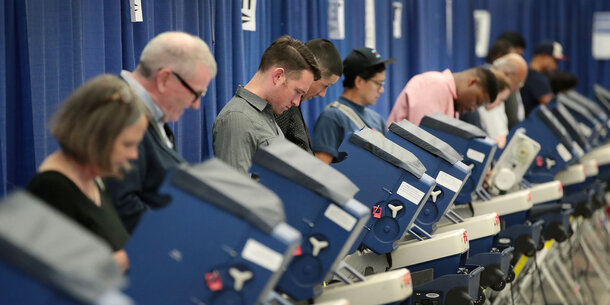Federal and state law protects voters, poll workers, and election officials from intimidation and aggressive behavior in multiple ways:
- The law prohibits intimidation and harassment of voters and places severe limits on which individuals can observe elections and what they can do.
- Election officials and law enforcement are empowered to protect voters and elections workers by keeping aggressors away from polls and vote counting locations, placing limits on their conduct, and enforcing the law against them if necessary.
The law in Georgia is crystal clear: intimidating voters is a crime. Ga. Code §§21–2–566(3)-(4) and 21–2–567; 18 U.S.C. §§ 241 and 594; 52 U.S.C. § 10101(b). Examples of illegal voter intimidation could include:
- Direct confrontation of prospective voters
- Insulting, offensive, or threatening language
- Raised voices
- False information about voter requirements
- Blocking entry to a polling place
- The use or threat of physical force
- Guns at polling places. All firearms, apart from those belonging to police officers and certified security guards, are prohibited within 150 feet of polling places. Ga Code § 21–2–413(i).
Any actions that have the effect of intimidating voters are also illegal, regardless of intent. 52 U.S.C. § 10307(b).
It is illegal to intimidate poll workers and election officials in Georgia.
Georgia law provides strong protections for poll workers and election officials. It is a felony under Georgia law to threaten a poll worker or election official, use violence against a poll worker or election official, or attempt to prevent a poll worker or election official from doing their job in any way. Ga. Code § 21–2–566(1)-(2).
Intimidation of poll workers and election officials is illegal at all stages of the election process, including during mail ballot processing and vote counting.
Protections for election officials and poll workers continue after votes are cast. Georgia’s protections against intimidation of election officials and poll workers extend to the vote counting process and all other aspects of election administration. Intimidating election officials or poll workers during mail ballot verification or ballot counting processes is a felony. Ga. Code § 21–2–566(1)-(2).
There are strict legal limits on who can be a poll watcher in Georgia.
Not just anyone can show up to a polling place and be a poll watcher. Georgia law subjects poll workers to strict limits, and election officials are empowered by law to remove unauthorized or unruly poll watchers.
- All poll watchers must be identified to election officials in advance of the election by party or candidate representatives. Ga. Code § 21–2–408(b).
- All poll watcher appointments must be confirmed in writing and submitted to election officials before Election Day. Ga. Code § 21–2–408(b).
- All appointed poll watchers must report immediately to the poll manager to obtain their official poll watcher badges prior starting their shifts. Ga. Code § 21–2–408(d).
There are strict legal limits on what poll watchers can do at polling places in Georgia.
Authorized poll watchers may not do whatever they want at polling places. In addition to the prohibitions on intimidation, Georgia law imposes strict rules on poll watcher behavior inside polling places:
- Poll watchers may not in any way interfere with the conduct of the election. Ga. Code § 21–2–408(d).
- Poll watchers may not talk to voters, use cell phones, take photos, record videos, or campaign for candidates. Code § 21–2–408(d).
- Election officials are authorized to remove any poll watcher who fails to follow these rules after a warning. Ga. Code § 21–2–408(d).
There are strict legal limits on what poll watchers can do during the ballot tabulation process in Georgia.
The rules and regulations that apply to poll watchers at polling places also apply during the mail ballot tabulation process and the vote counting process.
- Political parties may only designate two poll watchers to monitor the mail ballot tabulation process. These monitors must be appointed in advance. Ga. Code § 21–2–386(a)(3).
- Anyone who materially interferes with or interrupts an election official or poll worker’s duties during mail ballot processing or the vote count is guilty of a felony. Ga. Code § 21–2–566(2).
Georgia law strictly limits the conduct of anyone seeking to challenge a voter’s right to vote.
Challengers must abide by strict regulations at all stages of the election process in Georgia. Any challenge that is intended to intimidate or results in intimidation is a felony under Georgia law. Ga. Code § 21–2–567.
- Any challenge to a voter’s right to vote must be made in writing, prior to the voter casting a ballot, and must distinctly specify the grounds for the challenge. Ga. Code § 21–2–230(a).
- A challenge must be based on specific personal knowledge or evidence that a voter is ineligible. Ga. Code § 21–2–230(d).
- It is illegal under federal law to challenge any voter’s eligibility based on their race, ethnicity, national origin, language, appearance, surname, or religion. 18 U.S.C. § 242; 42 U.S.C. § 1983; 52 U.S.C. §§ 10301, 10303, 10503.
- Challenges can’t be based solely on returned mail, the racial or ethnic composition of a polling place, or discrepancies between the voter registration list and any other list of people. 52 U.S.C. § 10101(a)(2)(B).
- If a challenge is actually based on personal, specific knowledge or evidence, the voter must be given the opportunity to address the challenge before the board of registrars immediately. A voter who can’t immediately appear should be allowed to cast a provisional ballot. Ga. Code § 21–2–230(i).
Election officials are empowered to remove any individual who is disruptive or is not adhering to any of these rules.
Ga. Code § 21–2–90 puts poll officers in charge of managing polling places, and § 21–2–493 puts superintendents in charge of the vote counting process. § 21–2–50 empowers the Secretary of State to assist election officials in these duties. Ga. Code § 21–2–408(d) authorizes Georgia election officials to remove any poll watcher who is disruptive or is not adhering to any of these rules.

